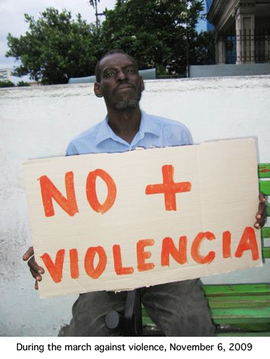My predisposition to respect differences has been put to the test with the "Letter in opposition to the current obstructions and prohibitions on social and cultural initiatives." [English translation available here.] Coming to me by way of email, the letter brings together the disenchanted and urgent voices of a group of intellectuals and academics. Among them I discover some of the names which, with a certain naivete in distant 2007, helped to build the myth of the "Raulista reforms." At that time they spoke about measures--more aesthetic than systematic--that should be applied to implementation, adjustments and transformations. Two years later they seem tremendously alarmed by the direction the country has taken. With their articles they propped up the hypothesis that the Cuban process could reinvent itself, as if this absurdity in which we live were a script written by the majority and not a rigid guideline issued from a single office.
Indeed, I should not blame others because they have taken too long to decide. I, who remained silent for almost thirty years, have no right to judge those who have worn the mask of conformity, the passive face of those who don't want any problems. I welcome any initiative that brings to light this river of criticism that has been diverted into the caves of our fear over several decades. So, I will offer my hand, without reproach, to those who assume the risk of expressing themselves, and in this way diminish their fear of moving from mechanical applause to open criticism.
The letter is notable for several gaps, notably in the list of facts that prove the "increase in bureaucratic-authoritarian control." Missing from this account are the bitter events of last December 10th, the increase in the so-called repudiation rallies, the harassment of several opponents, and the use of physical violence against many of them. Their use of the term "counterrevolution" merits special attention, as the signatories adopt the degrading and exclusionary language that springs from the dais. It is surprising to see professors, economists and university graduates classifying--so complexly--their fellow-citizens. The society I sense in this document frightens me, a society where one can speak openly of Trotskyism, anarchy and socialism, but at the same time one that continues to gag social democrats, Christian democrats and liberals. If that is what is proposed, I am very sorry, but this is not the country where I want my grandchildren to grow up.
I do not think we will relive a "Pavonizaton" because in the end the hard-liner Luis Pavon* had no power to call to the streets a screaming, beating mob; nor the power to sentence anyone to thirty years imprisonment. The dark censors of those Five Grey Years lacked the authority to maintain a vigilance cordon around a house, to wiretap a telephone line, or to arrest--without taking to a police station--an independent journalist or a blogger. We are not living through a return of the cultural inquisitors, but rather the tightening of the screws of a dying system that has run out of arguments, the falling away of the final veil that has exposed the ugly face of authoritarianism.
The title is a reference to Niemoller's words: "First they came for the communists, and I did not speak out--because I was not a communist; Then they came for the trade unionists, and I did not speak out--because I was not a trade unionist; Then they came for the Jews, and I did not speak out--because I was not a Jew; Then they came for me--and there was no one left to speak out." To contextualize this idea I would like to ask the signers of the document if you will remain silent when they come looking for a "counterrevolutionary" or a "worm" or an "opponent", if you will be among those who beat others in the repudiation rallies, or among those who defend the victim.
Translator's note:
*Luis Pavon Tamayo headed Cuba's National Culture Council from 1971-1976, during which time he led a McCarthy-like effort targeting writers and artists, many of whom lost their jobs, their rights to publish or display their work, or were even sent into exile or to labor camps. In January of 2007 he appeared on Cuban television in a program where no mention was made of his past activities, infuriating many with his reemergence. The "Intellectual Debate" subsequently carried out through letters and emails, has been preserved on desdecuba.com's website, and is now being translated as part of the Cooperative Translation Experiment, Translating Cuba, and will be made available in English, for the first time, in its entirety.
Yoani's blog, Generation Y, can be read here in English translation.

